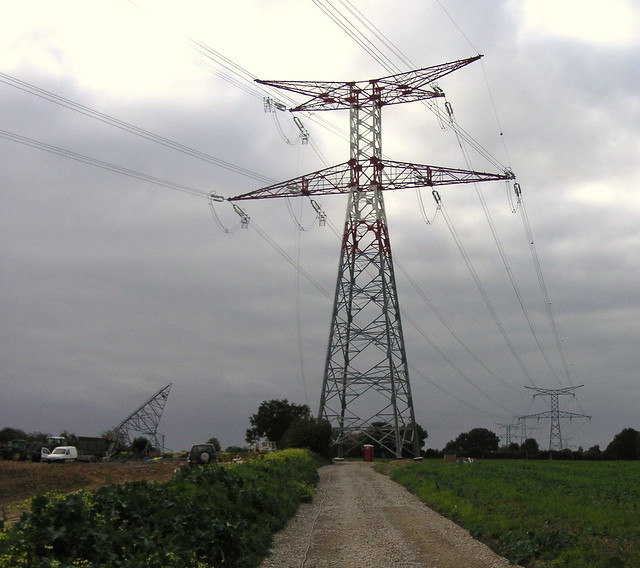
The lower Normandy that I’ve come to know is an amazing world of deep green fields, breathtaking skies, and a silence I have never heard before. The few houses you pass are modest and functional. They can be found between the long stretches of corn and the grazing land where content cows and sheep seem to have all the time in the world to eat and relax. One of the busiest metropoles in the world is 3 to 4 hours away, but out here it may as well be on another continent. Still, people here are busy, building things, cleaning things, working the land in one form or another. Some grew up here and continue a family tradition of agricultural work. Others come from different parts of the country, even foreign countries, to live the healthy, calm, and satisfyingly simple life they always wished for.
Looking out over the mystifying landscape one night, a friend shows me with great disappointment, massive new structures on the otherwise beautiful horizon. With their feet planted firmly in concrete, towering high above the corn and fruit orchards, are massive high tension power lines. “They just put them in, stretching from the power plant that isn’t online yet several hundred kilometers away,” my friend describes with an alarmed tone like someone talking about an oil slick or a forest fire swallowing up his neighbors. “The power company is planning to use these lines to sell electricity to Spain, all the nearby farmers protested, but the company built it anyway.” He went on to describe the extensive campaign to fight the power company and how they are able to seize land for installing power cables and towers regardless of what the nearby community thinks.
I stepped back from the situation and thought about how often scenario’s like this take place. The massive dam projects in India that displaced thousands of people with little to no consultation. The coal power plant right next door to the city of Ulan Bataar in Mongolia, bringing electricity and horrific air pollution to hundreds of thousands nearby. Throughout history and including today, projects are pursued for different reasons, some to improve lives, some just for the sake of profit or prestige. And regardless of their purpose, sometimes those same projects wind up harming the very people they set out to benefit.
These same questions will still be asked about major decisions and risky initiatives long after all of us have left the planet, when is worth it and when is it not worth it? Innovation and development that improves quality of life for more people on this planet – who could argue with that? But innovation and development for the sake of profit for a tiny few while harming a larger part of the population – why should that be acceptable?
A different issue but yet somehow related, I’m reminded of Mario Savio’s speech in 1964: “There’s a time when the operation of the machine becomes so odious, makes you so sick at heart, that you can’t take part! You can’t even passively take part! And you’ve got to put your bodies upon the gears and upon the wheels…upon the levers, upon all the apparatus, and you’ve got to make it stop! And you’ve got to indicate to the people who run it, to the people who own it, that unless you’re free, the machine will be prevented from working at all!”